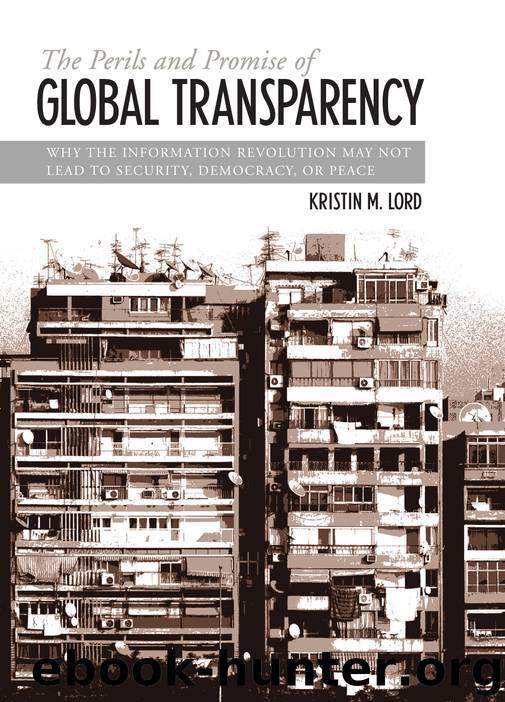The Perils And Promise of Global Transparency by Kristin M. Lord

Author:Kristin M. Lord [Lord, Kristin M.]
Language: eng
Format: epub
Published: 2011-02-17T05:00:00+00:00
102
The Perils and Promise of Global Transparency Citizens can express opposing viewpoints and many of those views are aired in the media. In some areas, the government is both transparent and responsive.
Nonetheless, the link between openness and the potential for political change in Singapore is quite weak. There are significant constraints on the ability to use information in order to apply political pressure or to organize opposition to government policies. Cultural, political, and technical conditions encourage citizens to censor themselves. And, most importantly, the government argues that controls are necessary in order to protect the stability, security, and prosperity of Singapore. So far, most Singaporeans seem to agree.
As noted in chapter 3, transparency within a society can be measured along three dimensions: debate, control, and disclosure. Debate refers to the level of societal competition over ideas and the incentives faced by the government and by other actors to disclose information about government decision making and actions. Control refers to the degree to which a government can control the flow of information in a society and the potential for groups to disseminate information that is contrary to the official government position. Disclosure refers to the degree to which the government actively and intentionally releases information to the public.61
By these measures, Singapore is not a particularly transparent society—but it is also not as authoritarian as some caricatures suggest.
Singapore has one of world’s most competitive economies and is well integrated into the international economy. Sixty-five percent of Singaporean homes have Internet access and 99 percent of Singapore’s homes, offices, and schools can connect to the Singapore ONE broad-band network. Ninety-one percent of the population subscribes to mobile services.62 The country is a major hub for media companies in the Asia Pacific region, with more than 30 companies maintaining headquar-ters or bureaus there including Reuters, the Economist, the International Herald Tribune, and Asahi Shimbun.63 According to Singapore’s Ministry of Information and the Arts, there are approximately 5,500
newspapers and magazines circulating in Singapore.64 Singapore has open borders and citizens travel freely. A high percentage of Singapore’s population, nearly one in five people, is comprised of foreigners.65 To protect its interests, Singapore is active in international organizations like the United Nations that encourage the disclosure of various types of information. Indeed, a recent report by AT Kearney and Foreign Policy magazine named Singapore the most globalized society on earth.66
Despite being firmly embedded in a global system characterized by rising transparency and decentralization, Singapore’s government is far Transparency and Governance
103
from transparent and there are significant controls on the ability of citizens to wield information to mobilize political power. The government controls information in a variety of ways. First, there is no viable opposition to the dominant People’s Action Party (PAP).67 The lack of a competitive party system inhibits the release of more information into the public domain, since competing parties have an incentive to illuminate rivals’ mistakes and their own strengths. Despite free elections and the existence of 22 registered opposition parties, the PAP held 82 of 84
elected parliamentary seats and all ministerial positions in 2001.
Download
This site does not store any files on its server. We only index and link to content provided by other sites. Please contact the content providers to delete copyright contents if any and email us, we'll remove relevant links or contents immediately.
| Anthropology | Archaeology |
| Philosophy | Politics & Government |
| Social Sciences | Sociology |
| Women's Studies |
The Secret History by Donna Tartt(19053)
The Social Justice Warrior Handbook by Lisa De Pasquale(12187)
Thirteen Reasons Why by Jay Asher(8893)
This Is How You Lose Her by Junot Diaz(6877)
Weapons of Math Destruction by Cathy O'Neil(6265)
Zero to One by Peter Thiel(5786)
Beartown by Fredrik Backman(5737)
The Myth of the Strong Leader by Archie Brown(5500)
The Fire Next Time by James Baldwin(5431)
How Democracies Die by Steven Levitsky & Daniel Ziblatt(5215)
Promise Me, Dad by Joe Biden(5141)
Stone's Rules by Roger Stone(5081)
A Higher Loyalty: Truth, Lies, and Leadership by James Comey(4954)
100 Deadly Skills by Clint Emerson(4921)
Rise and Kill First by Ronen Bergman(4779)
Secrecy World by Jake Bernstein(4741)
The David Icke Guide to the Global Conspiracy (and how to end it) by David Icke(4708)
The Farm by Tom Rob Smith(4502)
The Doomsday Machine by Daniel Ellsberg(4484)
